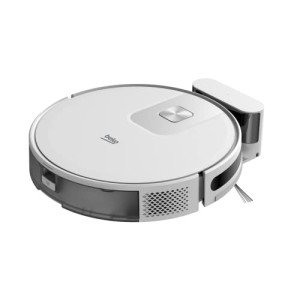12 Facts About Autonomous Vacuum To Make You Think Twice About The Cooler. Cooler
The Rise of Autonomous Vacuums: Revolutionizing Home Cleaning
In the age of technology, home tasks are ending up being progressively automated, and one of the most noteworthy advancements in this world is the autonomous vacuum. These smart cleaning robotics are developed to relieve the drudgery of standard vacuuming, making them popular amongst time-strapped households. This article explores the development, performance, benefits, and constraints of autonomous vacuums, along with a contrast of a few of the leading designs on the market today.
What is an Autonomous Vacuum?
An autonomous vacuum, likewise understood as a robotic vacuum cleaner, is a small, automated gadget that navigates through your home to tidy floors without human intervention. Geared up with sensing units, electronic cameras, and advanced software application, these vacuums can detect challenges, avoid stairs, and enhance cleaning paths. They normally run from a rechargeable battery, going back to their charging stations when their power is low or when cleaning jobs are finished.
Key Features of Autonomous Vacuums
Smart Navigation:
- Utilizes sensing units and algorithms to map the environment.
- Can navigate complicated designs and avoid challenges.
Scheduling:
- Allows users to set cleaning times.
- Can operate when your house is empty, ensuring very little disturbance.
Connectivity:
- Many designs connect to Wi-Fi, enabling app control and integration with wise home systems.
- Users can personalize settings, check cleaning status, and receive alerts through mobile applications.
Suction Power:
- Varies in between models; some deal adjustable suction settings for different floor types.
- High-end models feature powerful suction capable of getting family pet hair and deep dirt.
Floor Type Adaptability:
- Capable of cleaning carpets, wood, tiles, and more.
- Particular designs focus on tailored cleaning for numerous surfaces.
The Advantages of Using Autonomous Vacuums
1. Time-Saving
One of the most considerable advantages of autonomous vacuums is the quantity of time they conserve. Rather than spending hours pushing a standard vacuum, homeowners can set robotic vacuums to tidy while they are taken part in other activities.
2. Constant Cleaning Schedule
With the ability to schedule cleanings, these vacuums guarantee that areas are routinely cleaned up, leading to a cleaner home in general. Routine cleaning helps preserve indoor air quality, specifically for households with allergies or asthma.
3. Smart Home Integration
Lots of autonomous vacuums can be integrated with smart home systems for smooth operation. Going Here can manage their vacuums through voice commands through gadgets like Amazon Alexa or Google Assistant, boosting user convenience.
4. Compact Design
The slim profile of these gadgets permits them to clean up under furniture, such as couches and beds, where standard vacuums frequently can not reach.
5. Pet-Friendly
For animal owners, autonomous vacuums can be a game-changer, as they are typically geared up with specialized functions for choosing up pet hair and dander, contributing to a cleaner home environment.
Limitations of Autonomous Vacuums
Regardless of their numerous advantages, autonomous vacuums also have restrictions:
1. Limited Deep Cleaning
While these vacuums efficiently keep cleanliness, they might not replace the efficiency of a deep clean supplied by conventional vacuums, especially for greatly stained areas.
2. Capability Constraints
Many autonomous vacuums come with little dust bins that need to be cleared frequently, particularly in larger homes or homes with pets. This can be a trouble for some users.
3. Navigation Challenges
Although navigation innovation is constantly enhancing, some models may battle with particular layouts, especially complicated spaces with many challenges or really small rooms.
4. Cost Point
While costs have actually become more accessible, high-end designs can still be rather costly, posing a barrier for some consumers.
Contrast of Top Autonomous Vacuum Models
Model
Smart Features
Battery Life
Suction Strength
Cost Range
iRobot Roomba 980
App Control, Voice Assistant
120 minutes
1700 Pa
₤ 700 – ₤ 900
Roborock S6 MaxV
Advanced Mapping, Connectable
180 minutes
2500 Pa
₤ 600 – ₤ 800
Ecovacs Deebot Ozmo
Mopping, Smart Home
110 minutes
1500 Pa
₤ 450 – ₤ 700
Neato Botvac D7
Laser Navigation, Custom Zones
120 minutes
2000 Pa
₤ 800 – ₤ 900
Shark IQ Robot
Self-Emptying Base, Smart Map
90 minutes
1500 Pa
₤ 400 – ₤ 600
Significant Takeaways
- Smart Features: Consumers must prioritize designs providing robust wise functions for convenience and performance.
- Battery Life: A longer battery life is advantageous for bigger living areas.
- Suction Strength: Depending on home requirements, varying suction power can substantially affect cleaning performance.
Frequently Asked Questions about Autonomous Vacuums
Q1: How do I maintain my autonomous vacuum?
A: Regular maintenance includes cleaning the brushes, emptying the dustbin, and looking for clogs. Furthermore, keeping the sensing units clean up will help maintain navigation precision.
Q2: Can robotic vacuums tidy carpets and carpets?
A: Yes, many robotic vacuums are designed to effectively tidy both hard surfaces and carpets. However, suction power may differ based upon the design.
Q3: Do robotic vacuums need Wi-Fi?
A: While numerous autonomous vacuums benefit from Wi-Fi connection for app control and updates, some models can operate individually without a cordless connection.
Q4: How frequently should I run my robotic vacuum?
A: It depends on your living scenario, however running it numerous times a week is often advised, specifically for homes with family pets.
In conclusion, autonomous vacuums represent a substantial development in home cleaning technology, appealing benefit and effectiveness. While these gadgets may not entirely replace conventional vacuum, they are certainly handy in preserving a clean living environment. As innovation continues to evolve, the future of home cleaning looks appealing, and these devices are at the leading edge of the transformation.
